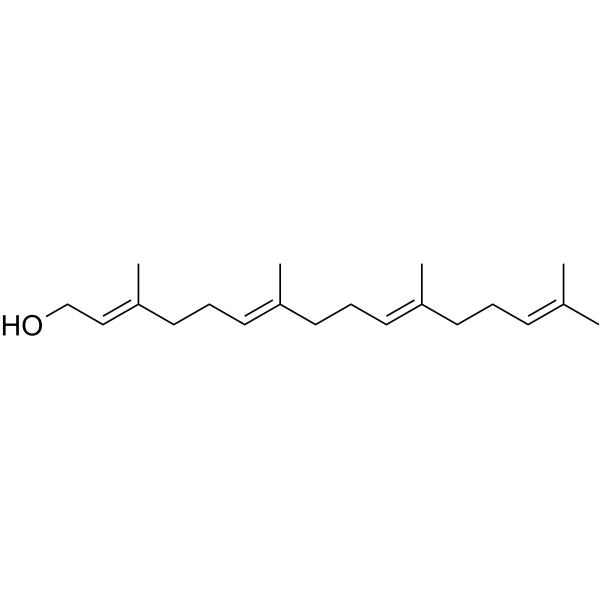
Geranylgeraniol
CAS No. 24034-73-9
Geranylgeraniol( Tetraprenol | FT0626663 | CJ24095 )
Catalog No. M29374 CAS No. 24034-73-9
Geranylgeraniol is an isoprenoid found in fruits, vegetables, and grains, including rice. Geranylgeraniol inhibits growth and induces apoptosis of various tumor cells. Geranylgeraniol protects monocytes against statin-induced cytotoxicity and suppresses the growth of Mycobacterium.
Purity : >98% (HPLC)
 COA
COA
 Datasheet
Datasheet
 HNMR
HNMR
 HPLC
HPLC
 MSDS
MSDS
 Handing Instructions
Handing Instructions
| Size | Price / USD | Stock | Quantity |
| 100MG | 35 | Get Quote |


|
| 200MG | 50 | Get Quote |


|
| 500MG | 84 | Get Quote |


|
| 1G | Get Quote | Get Quote |


|
Biological Information
-
Product NameGeranylgeraniol
-
NoteResearch use only, not for human use.
-
Brief DescriptionGeranylgeraniol is an isoprenoid found in fruits, vegetables, and grains, including rice. Geranylgeraniol inhibits growth and induces apoptosis of various tumor cells. Geranylgeraniol protects monocytes against statin-induced cytotoxicity and suppresses the growth of Mycobacterium.
-
DescriptionGeranylgeraniol is an isoprenoid found in fruits, vegetables, and grains, including rice. Geranylgeraniol inhibits growth and induces apoptosis of various tumor cells. Geranylgeraniol protects monocytes against statin-induced cytotoxicity and suppresses the growth of Mycobacterium.
-
In VitroGeranylgeraniol (0-10 μM; 24 h) dose-dependently suppresses the LPS-induced increase in the mRNA levels of Il-1β, Tnf-α, Il-6, and Cox-2.Geranylgeraniol (10 μM; 24 h) inhibits the phosphorylation of TAK1, IKKα/β, and NF-κB p65 proteins as well as NF-κB nuclear translocation induced by LPS while maintaining IκBα expression.Geranylgeraniol, (50 μM; 24 h) eliminates cell damage caused by Simvastatin (HY-17502) (10 μM) and Mevalonat (10 mM), and reduces the inflammatory marker and the damage of the mitochondria, maintaining its shape and component. Western Blot Analysis Cell Line:MG6 cell Concentration:0, 1, 10 μM Incubation Time:24 hours Result:Suppressed by TAK1, IKKα/β, and NF-κB p65 proteins level at 10 μM.RT-PCR Cell Line:MG6 cell Concentration:10 μM Incubation Time:0, 6, 12, 24 hours Result:Significantly inhibited pro-inflammatory cytokine Il-1β, Tnf-α, Il-6, and Cox-2 mRNA level.
-
In VivoGeranylgeraniol (725 mg/kg/d; p.o.; 90 d) is not toxicologically significant with a dose below 725 mg/kg/d in rats.Geranylgeraniol (483 mg/kg/d; p.o.; 10 d) suppresses lipopolysaccharide-induced inflammation via inhibition of nuclear factor-κB activation in rats. Animal Model:Han Wistar rats (169-192 g for male; 116-152 g for female)Dosage:0, 725, 1450, and 2900 mg/kg Administration:Oral gavage; once daily; 90 days Result:Showed the lowest observed adverse effect level (LOAEL) for local effects and the no observed adverse effect level (NOAEL) for systemic effects as 725 mg/kg/d.Reduced body weights by 12.9 and 21.6% in the intermediate- and high-dose group males, respectively, compared to controls.Animal Model:Wistar rats (male, 8-week-old, 130-150 g) Dosage:0, 48.3, 483, 4830 mg/kg Administration:Oral gavage; once daily; 10 days; with or not LPS challenge (i.p.; 0.5 mg/kg)Result:Suppressed LPS-induced inflammatory cytokines and mRNA expression of LPS-induced inflammatory genes in liver with doses of 483 mg/kg and 4830 mg/kg.Suppressed protein levels of IRAK1, TRAF6, and TAK1, originating from transcriptional down-regulation with doses of 483 mg/kg and 4830 mg/kg.
-
SynonymsTetraprenol | FT0626663 | CJ24095
-
PathwayApoptosis
-
TargetApoptosis
-
RecptorApoptosis
-
Research Area——
-
Indication——
Chemical Information
-
CAS Number24034-73-9
-
Formula Weight290.491
-
Molecular FormulaC20H34O
-
Purity>98% (HPLC)
-
SolubilityIn Vitro:?DMSO : 100 mg/mL (344.26 mM)
-
SMILESCC(C)=CCC\C(C)=C\CC\C(C)=C\CC\C(C)=C\CO
-
Chemical Name——
Shipping & Storage Information
-
Storage(-20℃)
-
ShippingWith Ice Pack
-
Stability≥ 2 years
Reference
molnova catalog



related products
-
DB1976
DB1976 is a selenophene analog of DB270 and a highly potent, cell-permeable, fully efficacious transcription factor PU.1 inhibitor.
-
Trk-IN-9
Trk-IN-9 (Compound 12) is a potent inhibitor of TRK that inhibits the proliferation of Km-12 cell lines and induces apoptosis in a concentration-dependent manner.
-
Curzerene
Curzerene is a sesquiterpene is isolated from the rhizome of Curculigo orchioides Gaertn with anti-cancer activity. Curzerene induces cell apoptosis[1].Curzerene inhibits glutathione S-transferase A1 (GSTA1) mRNA and protein expression.



 Cart
Cart
 sales@molnova.com
sales@molnova.com


